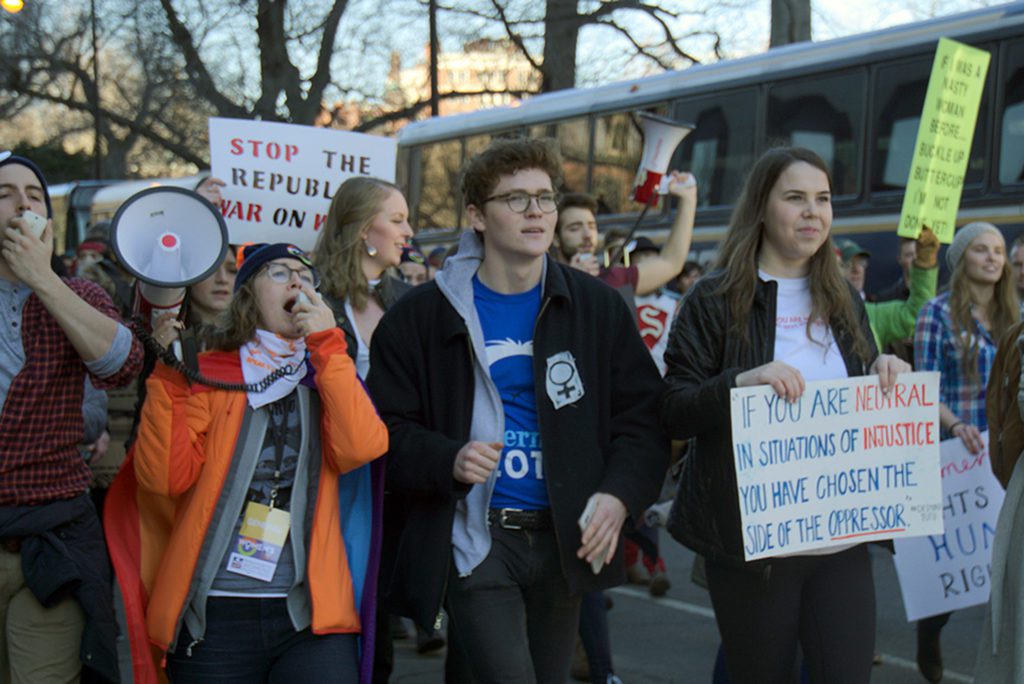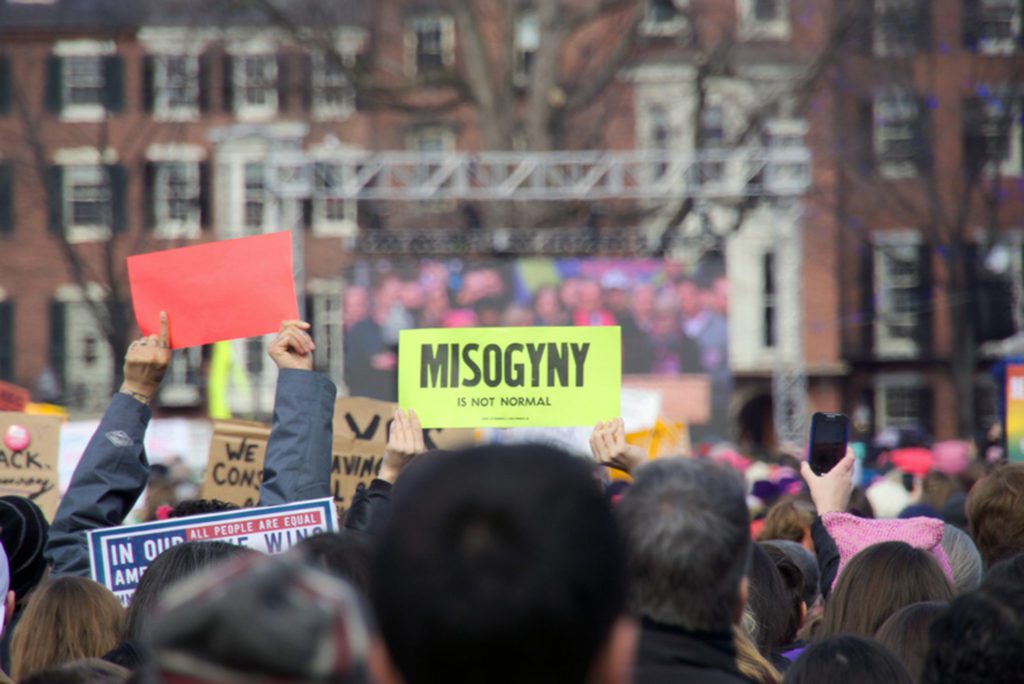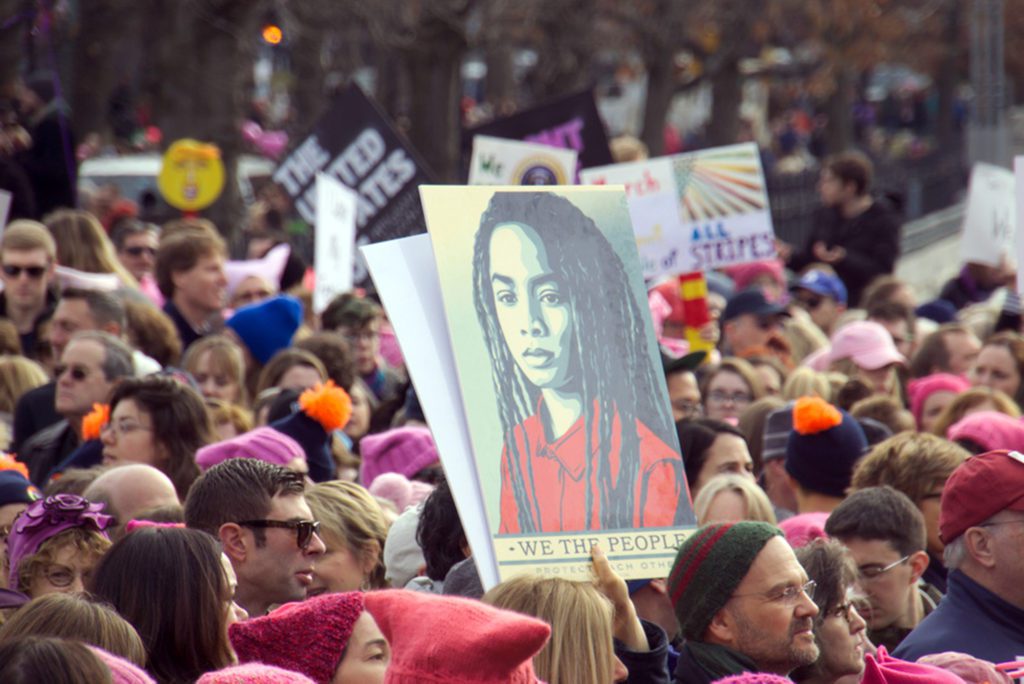All photos are by Julian Lemus.
On January 20th, we found ourselves pushed unceremoniously over the precipice of a political moment, post-Cold War, post-9/11 and now further beyond a president that graced our television sets as teenagers and young adults. In reflection, I have become self consciously aware of past movements of demonstrative defiance. When we were younger, historic events were always well documented, inked on a linear timeline like the kind we’d drawn in grade school, scrawled out all staccato and measured, rather than the messy slurry of consequentiality today. Whatever notable pivot points in history we made fit on 8.5 x 11 paper we had no particular part in, but linger in cultural memory, the collective American past. In the wake of the 2016 election, we are unsure of ourselves, no longer in grade school, smiling up in adoration at authority, etching out declarations of kindness on wide-ruled paper as if the world were that simple. We are no longer adolescents either, smearing on our eyeliner, wanting to set the world on fire, painting our faces with its ashes in pretty destruction. We find ourselves in a limbo between compelling ourselves to action and the necessary tasks of reflection and homage.

On January 21st, riding the train backwards to Alewife, I offhandedly wondered if there really was nobility in group commiseration and nebulously articulated frustration, even if the target of this frustration was unambiguous. Protests and politics are invariably linked to individual identity, and are ways by which young people carve out their senses of themselves, still making their way in their world. Grievances turn into objective truths. Insecurity colors even our most articulate purposes. It’s a natural thing. Prior to attending the Boston Women’s March I was aware of the vicissitudes of history, public dissent, and the canonization of these values as progressive aesthetic. It wasn’t so much a conscious reflection on my part, but rather an inclination of mine to consider quintessential images, grainy black and white photographs of youthful and sinewy defiance, though we are not multiple generations removed from sixties. It was an inclination to consider the tumultuousness of decades and legacies pre-dating myself and everyone else I showed up to march with.
Boston Common, Grant Park, the National Mall and so many other public spaces looked the same from the aerial shots populating everyone’s conversational worlds, networks and feeds,pressed together bodies dotted with varying shades of pink, a swimming mosaic from above. All of these places converged for a multitude of linked causes, wavering between calls for particular policy actions, soft ridicule for its soothing comfort, and outright condemnation of the new administration. They shared catchy slogans, toothy smiles, furrowed brows, and the communality of the moment. As we later saw, demonstrations spanned all seven continents, rustbelt towns and deeply red states showing that the momentum of the day wasn’t reserved for coastal elites in love with banal, acerbic condemnation, reading Hillbilly Elegy on the train in an apologetic attempt to decode the social mores of an alien species.
When I arrived at the march, the Common had been filled, its rolling green spaces, its monuments and trees stripped of foliage illogically rising from the crowd. Despite the similarities with New York, DC, Los Angeles and everywhere outward and between on that day,Boston’s gathering felt particularly its own, its history of progressivism a highlight of both Marty Walsh’s and Senator Elizabeth Warren’s orations. I’ve grown to love my adopted home, its winding, laughably impossible physicality and bare-faced charm, the warmth of the city’s innards despite the frigidity of the exterior. Both the speeches rang with the no-nonsense passion that I’ve grown accustomed to, a warm frankness devoid of adornment. Marty Walsh’s speech reflected on Boston and its role in the American experiment, demonstrative of the radical nature of that call to self-determination, a redrawing what it means to be an individual in the context of an abstract, governing body. Abolitionism, women’s suffrage, and the movements of the 20th Century were called upon, in solemn pride and jovial triumph. Elizabeth Warren’s speech sought to redefine the relationship between the individual and the government again, the latter the protector of the deprived, vulnerable, and persecuted, a powerful lever against ingrained social injustice. Other speakers reflected on the need for such organization, from their own experience in activism for racial justice, indigenous rights, and workers rights, reflecting on the need for intersectionality. Protesters listened and exclaimed amongst themselves, at one point filling the air with a lilting rendition of Amazing Grace, led by the daughter of educator Claudia Fox Tree.

The march itself was a winding mile. We were all uplifted by marker scrawled declarations of love and kindness, held by bundled children on their father’s shoulders, overwhelmed with color and motion. We chatted with strangers, marveling at the January sunshine, the precociousness, the joyful grit, and ironic humor. There were chants about this president’s tax returns, small hands, and bad ideas. We lauded science and compassion, virtue and reason. That in itself felt so quintessentially Bostonian. I was overwhelmed in ways I didn’t expect to be, by the enormity of the gathering, by my fondness for my fellow marchers and their wry humor, the number of causes that rolled into the march’s purpose. Downtown Boston epitomized unambiguous resistance, determined and unyielding.

We all wonder what to do now. Before I wrote this, I was crying laughing at the post-modern internet absurdity of our press secretary screaming into the void about Dippin’ Dots, the ice cream of the hopefully nuclear apocalypse-free future. Arguably, the world needs more of this kind of news. The beginning, middle and end of all my conversations these past days seemed to all include one mention of “did you hear??” re: some new executive order, soundbyte, or tweet. I and most other people I know have been lost in this particular madness, the liberal contradiction of having the time to waste on abstract panic. I could blink and see think pieces on the insides of my eyelids, tattoo myself with editorial board condemnations, and spend the next four years oscillating between indignant outrage and disinterested malaise, curled up next to my laptop open to the front page of the New York Times, sharing my mattress with the bad news of the day.
I don’t know if Donald Trump will release his tax returns, properly address his conflicts of interest, acknowledge that climate change is real and take purposeful action, consider the long-run consequences of income inequality, bestow agency on women regarding their reproductive health, or re-evaluate his views on immigrants he sees fit to demonize. I also don’t know if he will treat issues of complexity with any careful nuance, or remain this nation’s elected sledgehammer, an object of blunt and uncompromising force, or a chameleon with an insidiously simple lizard’s instinct. The latter seems undoubtedly more likely, considering these past few days. The march may or may not have changed things, in a concrete sense. But millions of people outside and breathing and moving together is a wonderfully surreal moving picture, to be framed in black and white, a static moment in a dynamic world to be poured over by students of some future generation. I had forgotten that human beings are social animals, the march a reminder that it does not serve us to stare into screens as post-modern cave dwellers, refreshing our newsfeeds into 21st Century pathology.
We look to the future with determination, rolling energy, and purpose. We do well with pointing out each other’s hypocrisies, our frivolities, our eye-rolling tendency to signal to our similar circles that we are indeed Good with a capital G with a NowThis/OccupyDemocrats video or safety pin. But we do even better with fresh eyes, with creation rather than rehashed calls for destruction. To me the event resurrected a politic of the street that had only existed in those faded black and white images, our Common populated with wrinkled laugh lines and smooth faces holding baby fat, the rest of us in between. I looked out at the world with comprehension, hope beyond crisis. It was enough for the moment, but as we all know, there is work to be done.



Very well done.
SR…..very well done and what an experience! You presented the event from a human perspective. Wendy